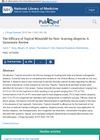Effectiveness and Safety of Low-Dose Oral Minoxidil in Male Androgenetic Alopecia
May 2019
in “
Journal of The American Academy of Dermatology
”

TLDR Low-dose oral minoxidil effectively improves male hair loss with mild side effects.
The study aimed to evaluate the effectiveness and safety of low-dose oral minoxidil (OM) in men with male androgenetic alopecia (MAA). A total of 41 men with a mean age of 33.3 years were included, and they received OM at a daily dose of 2.5 mg or 5 mg. Clinical improvement was observed in 37 patients (90.2%), with 11 of these patients (26.8%) presenting a marked improvement. Adverse effects were detected in 12 patients (29.3%), but all of the adverse effects were mild and well tolerated. OM at a dose of 5 mg daily was effective and presented an acceptable safety profile in the cohort of male patients with MAA.







